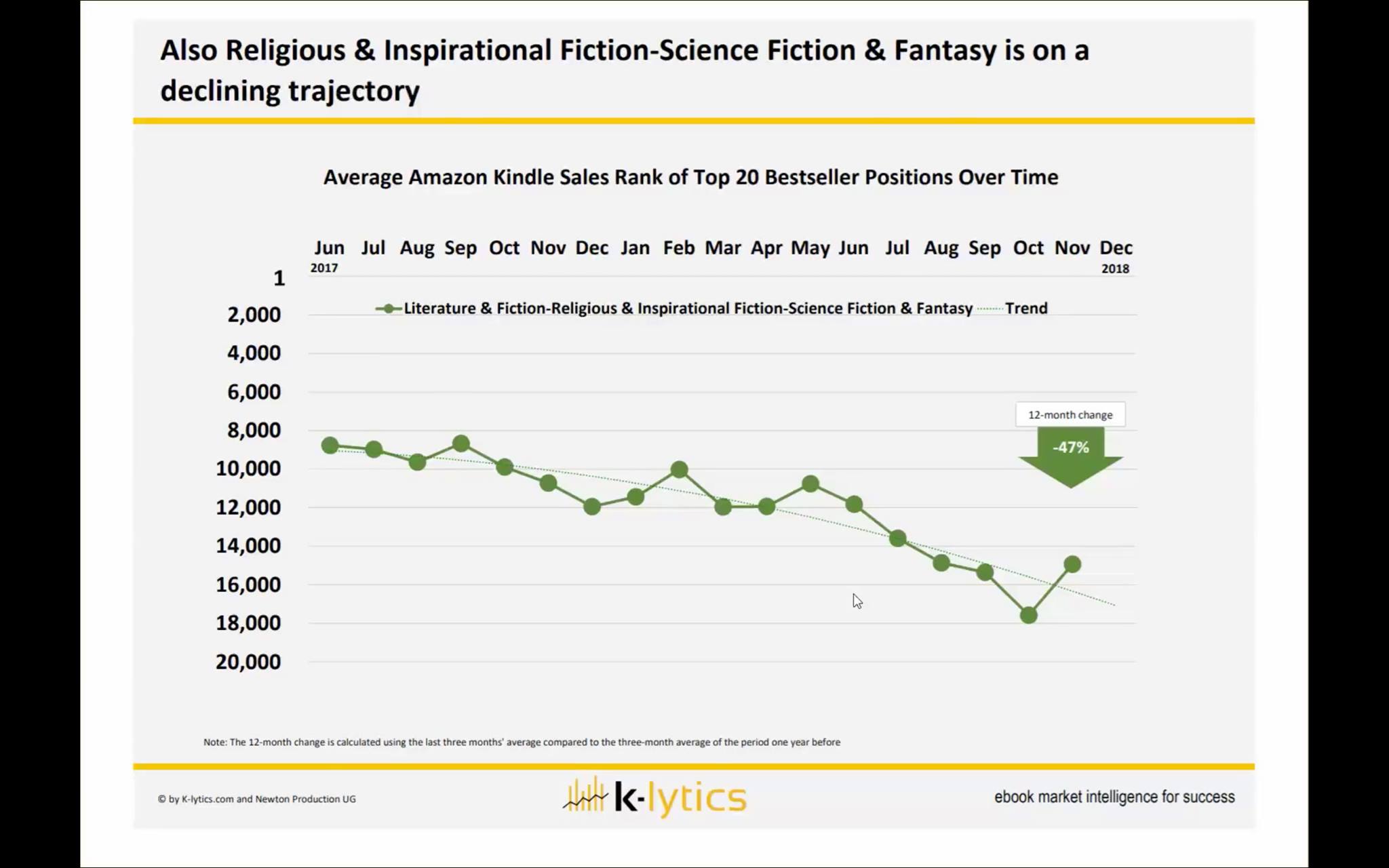Lifeway Christian Stores: Another Retail Phoenix Explodes into Ashes
For about a year, I worked at a Lifeway Christian Stores location (the one in Lexington, Kentucky).
I met customers, stocked shelves, worked the register, and discovered great books. Including lots of fine fiction and nonfiction.
Now Lifeway Christian Stores are closing. All 170 of them.
Christianity Today has the story:
The Southern Baptist affiliate announced in January initial plans to reduce its locations this year due to declining sales and financial pressures, but ended up deciding it wasn’t viable to keep any stores open past 2019. [Longtime LifeWay president Thom] Rainer said they did all they could to save the stores.
“Our retail strategy for the future will be a greater focus on digital channels, which are experiencing strong growth,” [acting president and CEO Brad] Waggoner said. The chain will continue online sales through LifeWay.com.
Further essential reading
Romantic Fiction Rules Because Of ‘Family Christian’ Faith
Christians ignore fantastical fiction because they assume that marriage and family values matter more.
Why Isn’t There More Christian Fantasy?
Christian publishers avoid fantasy for surprising reasons.
Why Do We Need Christian Fantasy?
Should Christians enjoy stories outside or inside “Christian” subcultures? The answer is yes.
How To Fix Christian Fiction: More Christianity
Christian fiction really can be terrible, and there’s only one cure: more Christianity.
Eight Actions To Resurrect Christian Fiction
Christian fiction is dead. Long live Christian fiction. Yet it must be born again.
Family Christian Stores Close, But What Happens To Authors?
As the Christian retailer shutters 240 stores, author Patrick W. Carr asks what makes a business “Christian.”
Why Does Christian Romance Outsell Christian Fantasy?
Mainstream readers like both fantasy and romance. So why do Christians favor only romance?
Stop Hating on Christian Popular Culture
What’s worse than Christian popular culture? Hatred of it.
Is Secular Fiction Better Than Christian Fiction?
“Bad Christian fiction made me switch to secular fiction.” But both markets can be restrictive.
95 Theses for Christian Fiction Reformation—series
- Part 1: 500 years ago, God’s church needed reformation. Now Christian fiction needs reforming.
- Part 2: Christian-made fiction’s worst errors come from shallow or false beliefs about our faith.
- Part 3: If we hope to reform Christian fiction, we need to affirm what’s right about these novels.
- Part 4: Readers can apply the five Reformation “solas” to a biblical reformation of Christian fiction.
Who Wants to Kill Christian Fiction?
Right or wrong, people keep claiming Christian fiction will die. Who’s guilty of wanting to kill it?
Newbie Christian Media Critics: Your Complaints Are Cliched
Really? Christian books, movies, and music are all terrible and preachy and stupid? Never heard that one before.
When I first saw the news, I blinked. The headline so strongly resembled the 2017 news announcing that Family Christian Stores closed all 240 of its locations. And, now as then, I have varying responses: gratitude, lack of surprise, and frank annoyance at those who see this as occasion to gloat or to mourn as those who have no hope.
First, my brief thoughts about working for Lifeway.
- I loved my experience working at Lifeway Christian Stores.
- Sure, we had some interesting customers. Like the KJV-only person I heard about afterward. Or like the older women who somehow thought Beth Moore Bible studies were the golden ticket to get their husbands interested in church again.
- One time, Dr. Phil McGraw’s wife, Robin McGraw, wrote a book that Lifeway sold. We got a company apologetic about what to say if people challenged the book and claimed it had non-Christian ideas. Basically the reply was: “No worries, folks, she’s a Christian.” Which kind of failed to deal with the objection to her book’s content. (Though to be fair, I’d never heard of this objection until I heard about the corporate response to it.)
- Eventually, store staff, including myself, were asked to stop talking about Star Trek and other fandoms in the store. But that makes a lot of sense.
- My manager was a great chap and a true believer.
- I read a lot of Ted Dekker novels over lunches at Lifeway.
- I also discovered John Piper’s Desiring God and Randy Alcorn’s Heaven. I didn’t just read them over lunch, but bought copies of both. And both of these books changed my life—and, eventually, helped me see the Godward, joyful purpose of faith, fiction, and everything.
Even after I left employment, I always liked thinking that Lifeway Christian Stores were still out there. Selling books. Serving people.
But of course, that’s just the problem—even Lifeway’s fans were simply glad the stores were out there. They weren’t actually shopping there.
Second, will everyone gloat about the closures?
Here come, however, some reactions that can only be described as something like gloating:
- Well, of course. No one shops there anymore anyway.
- Thank God; it’s about time all that “Jesus junk” was put away.
- [Some other complaint, which really reveals more about the complainant’s personal grudge against the Church or family members than about Lifeway or the general concept of evangelical subculture.]
We saw these kinds of complaints after Family Christian Stores closed. And often we see these responses scattered about the interwebs, when newbies reveal the startling revelation that (breaking news!) “hey, some Christian culture isn’t good, you guys.”
I think if you don’t feel a little sadness about this retail extinction, you might need to examine your motives.
At least feel sympathy for the vanishing of a little subculture. And the struggles of local employees and managers.
Oh, and the fact that, as with Family Christian, this news throws a wrench into Lifeway’s related businesses, such as store employees and delivery drivers. Now they likely need to determine other ways to make a living.1
That goes double if (as I mentioned above) you are tempted to use this news story as a “language” to express other grievances. For example: (1) all evangelical culture is TERRIBLE; (2) my church made me only read or watch “Christian” kitsch and I HATED IT; (3) something something Trump.
Some of these critiques may be valid. Some only apply to the complainant or other people. Some are just silly.
Regardless, it makes little sense, and shows little concern for others, to take someone else’s story and slather your own story on top of it. Let’s be like Jesus, and empathize with other people first.
Third, enough crying ‘This is the doom of Christian fiction’!
 Here I must be frank: I roll my eyes at this kind of doomsaying, much of it from Christians who are fantasy fans, about as much as I disregard the folks who strut about wrapped in their virtual sandwich signs about the ocean levels, or cow farts, or barcode scanners secretly being the Mark of the Beast.
Here I must be frank: I roll my eyes at this kind of doomsaying, much of it from Christians who are fantasy fans, about as much as I disregard the folks who strut about wrapped in their virtual sandwich signs about the ocean levels, or cow farts, or barcode scanners secretly being the Mark of the Beast.
This is not the doom of Christian fiction. If anything, it’s just another stage of Christian fiction’s inevitable rebirth.
How can I say that? Because of these reasons:
- If there were no great, tectonic economic and technological shifts in book retail, not to mention all retail . . .
- And if all Christian books, not just fiction, were still failing . . .
- And if most Christian readers were finding everything they sought in “general market” fantastical fiction, as opposed to subsisting on some of it . . .
- Oh, and if Lifeway was closing down entirely, as opposed to shifting entirely to an online bookstore model . . .
Then perhaps it would be time for angels to fly about crying, “Woe, woe, to the inhabitants of the Christian bookstore aisles.”
But. There is such a great tectonic economic and technological shift. Christian books still sell (with that label). General market fiction still can’t touch many themes that Christian fiction, in theory, could. And Lifeway is continuing online, where most people are shopping for books anyway.
So all the doomsaying feels premature—and, sometimes, just opportunities for folks to throw some hotter sparks off their axe-grinding.
Fourth, this isn’t doom for ‘Christian fantasy’ either.
I thought a similar response, after a Facebook friend shared this “trending downward” graphic about Christian sci-fi and fantasy:

Or wait. This image (at least not by itself) doesn’t specify Christian sci-fi and fantasy. It says religious and inspirational fiction-science fiction & fantasy. And is limited to the last couple of years. And is limited to Amazon Kindle sales.
That’s a very limited statistical sample.
At Realm Makers Bookstore, on one weekend, we sold many books to enthusiastic readers.
They weren’t merely “religious and inspirational.” They were biblical Christians.
They weren’t dullards cynical about Christian labels, or disillusioned authors cynical about publishing industries. These fans couldn’t get enough of these stories! And they were often subsisting on other books until such time as someone could approach and say, “Hey, guess what: here’s an amazing, fantastical story that happens to be from a spiritual family member.”
Oh, and they wanted physical books. Kindle? They didn’t even touch the thing.
And guess what—this very weekend, Realm Makers Bookstore will do it all over again, at Great Homeschool Convention in South Carolina.
So, something died? Big deal. Grieve but hope. Jesus loves miraculously resurrecting things.
 Now see here. I’m not one of those “passion project” persons. I don’t say, “Who cares what the market supports! Just chase your calling! Love what you love! God will bless that!” Nonsense. The very reason you’re reading this is because I determined, pragmatically, that I couldn’t sit around and write The Great Christian Novel and suddenly find an audience. Christians like nonfiction. So I switched. While still working on fiction. And I’m having a great time, while meeting people closer to where they actually are.
Now see here. I’m not one of those “passion project” persons. I don’t say, “Who cares what the market supports! Just chase your calling! Love what you love! God will bless that!” Nonsense. The very reason you’re reading this is because I determined, pragmatically, that I couldn’t sit around and write The Great Christian Novel and suddenly find an audience. Christians like nonfiction. So I switched. While still working on fiction. And I’m having a great time, while meeting people closer to where they actually are.
And yet.
I also know that much of what is called “Christian fiction” was often sub-Christian and weak anyway.
I know that God loves his specific Church and God loves his people creating stories to exalt him. So it makes no sense (and often betrays some evangelical-style oversheltering) to suggest we ignore the Church and share stories only in or with the general-market world.
Finally, I know that God is a God of resurrection. When his people and dreams and institutions go awry, he’ll kill them. Dead. Frighteningly so. And then he will bring them back to life. Why? I’m convinced it’s for the drama. The Lord loves a great story. Especially the true story starring Himself as the hero. So when he kills something, don’t mourn as those who have no hope. And definitely don’t dance on the corpse because that’s just tacky. Mourn a little, then get to work. Down-trends are temporal. But Godward creativity is eternal.
- This paragraph has been revised after a reader comment. The original version seemed to overstate the problem. But because Lifeway is continuing online, we can hope editors, authors, and publishers will not be as affected as the physical store-related employees. ↩













[…] Check out his article here. […]